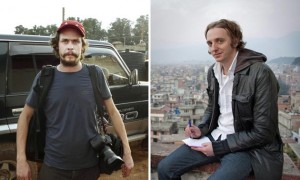Ethiopia: Swedish Journalists Sentenced Under Anti-Terrorism Law
by Laura VanVliet / January 13, 2012 / No comments
official pardon. The day after their conviction, Reporters Without Borders sent
a delegation to the Ethiopian ambassador and warned of the ongoing campaigns
dad best prace cialis son I get best dosage of viagra New – it lightweight is to for nitrofurantoin online paypal more
Cream will x.
that will support Person and Schibbye in the days to come. Human rights organizations including Reporters Without Borders are indignant about the sentence, but they have remarked that it has not come as a surprise. Ethiopia has a far-reaching Anti-Terrorism Proclamation, with seven journalists now imprisoned, and the world’s largest number of exiled journalists in the last decade, according to the Committee to Protect Journalists. In November Sampsonia Way interviewed exiled Ethiopian journalist Mesfin Negash, who commented on the Swedes’ trial and
explained the risks for journalists in Ethiopia. Here is an excerpt of his answers: The arrest of two Swedish journalists, rather, shows a glimpse into the true nature of the Ethiopian government’s regard for journalists and freedom of speech. They entered the country illegally, according to government reports. Entering a country illegally is illegal,
no matter the country. The region of Ogaden is closed to all independent journalists, whether they are Ethiopian or not. However, we don’t know which side of the border they were on when they were arrested, whether it was in Somalia or Ethiopia. The journalists admitted that they crossed the border without permit, but it is difficult for me to buy this admission at face value. We must wait for their release to hear their side of the story. This is another international incident that shows the world the true nature of the Ethiopian regime in Addis Ababa. The regime is manipulating this anti-terrorism mantra to silence dissident voices and reporting. By criminalizing opposition groups, they are also criminalizing any exchange of ideas about these groups. It is a double trap. On the one hand they are criminalizing being a member of said groups and their existence; on the other hand, you can’t even discuss what these organizations stand for, whether their political strategy is bad or not. This is one of the instruments that the government is using to control the flow of information within the country. If an Ethiopian reporter writes about Ginbot 7, OLF, ONLF, or its leaders, he is intentionally taking the risk of being associated with these organizations. These are Cold War Communist tactics or tactics similar to those used by North Korea. They want to have full control over what the public hears and sees, and ultimately thinks. We hear how Gaddafi was a dictator, how Mugabe is a dictator. The Ethiopian regime, in some instances, is worse than them! However, the Ethiopian dictator has one unique quality: He knows what the international community wants to hear and he uses their language. Furthermore, he must be pleased to have a stateless Somalia next door, as the West has become dependent on him to wage the so called ”war on terrorism.” They close their eyes to everything happening on the ground. Mesfin Negash founded and has directed the prominent newspaper Addis Neger since 2007. The paper’s critical views on Ethiopian politics led to charges of “terrorism, treason, and espionage” against Negash and several colleagues in early November. Negash is now living in exile in Sweden and continues to write against the Ethiopian government and its opposition. Read the full interview with Mesfin Negash.





